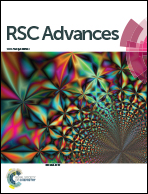Work function engineering derived all-solid-state Z-scheme semiconductor-metal-semiconductor system towards high-efficiency photocatalytic H2 evolution†
Abstract
An artificial semiconductor-metal-semiconductor Z-scheme photosynthetic system has recently been developed. Herein we suggest a general strategy for fabricating an effective Z-scheme system. The work function measured by a Kelvin probe and surface photovoltage spectroscopy were employed to obtain direct evidence for the photogenerated charge separation direction at metal-semiconductor interfaces. The suitable work function values of the components enabled the heterostructure of WO3/Au/CdS to exhibit more unobstructed charge carrier transfer. As a result, the WO3/Au/CdS Z-scheme system shows a better photocatalytic H2 evolution efficiency than WO3/Pt/CdS. These findings illuminate that the work function engineering of the intermediate metal plays a key role in Z-scheme photosynthetic systems.


 Please wait while we load your content...
Please wait while we load your content...